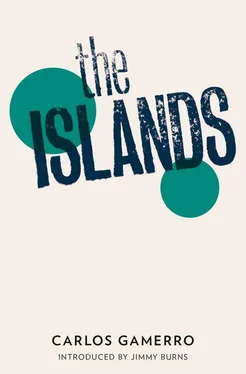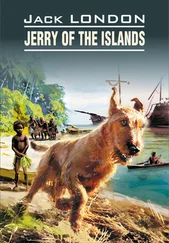I’d wondered about that more than once myself: why in the whole war the very same milicos, who had, in their own back yard, perpetrated all the atrocities in the world catalogue and added a few new ones of their own devising, hadn’t committed a single one against the native Islanders. Presumably, they were tending to their international image, but it just didn’t add up — too rational. Maybe it was just that, if you’re going to commit atrocities, you need to see the other as an inferior, and the Kelpers were too White, Aryan and Anglo-Saxon for the Argentinian milicos to dare trample on them. Resigning himself to political negotiation, Verraco had succeeded in interesting the Foreign Ministry in a purchase-and-sale plan: a million dollars for every Kelper in return for their acceptance of Argentinian sovereignty. The scheme was quite advanced when word filtered through to the ex-combatant centres, who organised a demonstration with the slogan ‘The Blood We Shed Is Not For Sale’, which Verraco himself took part in so as not to be caught with his pants down. ‘Now it’ll be another eight years and we’ll be back to square one, and in the meantime the bastard Kelpers will be fucking like rabbits to increase their worth, while we end up spending ten billion instead of one and a half.’
The English, on the other hand, he got on much better with: it wasn’t the first time he’d negotiated with them. He’d begun as soon as the war was over, when the victors returned 4,700 prisoners to the mainland on the Canberra and Verraco managed to sneak a lift: when he saw the English at the dock separating the officers from the winding lines of prisoners to keep them on the Islands, he’d got hold of a conscript with a bandaged eye and, taking him to one side, made him remove his coat and jacket and bandage, and swap them for his officer’s uniform, and barged his way back into the line. When the others started yelling, ‘Oy, you bloody queue-jumper,’ he lifted the patch and hissed furiously, ‘I’m a commando, you bloody fools; we’re going to take this boat and restart the war.’ Once he was on board, he discovered that all the deluxe cabins were taken and he’d be sent to sleep on the ballroom carpet, but remembering that when it came to sleeping arrangements he was still an officer, he decided to slip off in search of a cabin.
Tomás, ‘El Gordo’ Tomás, had just undressed for the first time in two months and, standing barefoot on the miraculously hot floor of the bathroom, was doing his best to recognise the skinny guy staring back at him in the mirror: hair matted in rat’s tails, the sunken hollows of his face covered by the undergrowth of patchy beard, an enormous head floating above a puny body with skinny little child’s arms and washboard ribs. Twenty kilos lighter, ten years older. Confused, thinking it was someone else in the mirror, he turned round and only found the half-open door, the silence of the cabin, Sergio’s feet; Sergio had been lying there in full combat gear for six hours staring at the ceiling without standing up or changing position since they’d arrived. The blissful rush of the hot rain made him forget everything: he was back at home getting ready for Saturday night and, when a knock came at the door, he almost shouted ‘Sod off, Tits. I’ll be out in a minute’ at his sister. Stepping back into his identity as a POW, he wrapped himself in a towel — spongy, white, unimaginable — and went out to see who it was; Sergio hadn’t taken his eyes off the ceiling in spite of the hail of knocking. Whirling in came Verraco, the Tasmanian Devil incarnate. ‘You fucking queers!’ he yelled. ‘These are the soldiers of the Argentinian Army? Your comrades-in-arms died in the trenches and you’re perfuming yourself like a cheap slut! What’s wrong with you, tarting yourself up like that? Got a date with a nice little English, have we? That why they gave you this cabin, is it? Get out of my sight, before I …’
In spite of the uniform, Tomás realised he was an officer and was about to obey the order automatically when something occurred to him:
‘Hang on. Shouldn’t you still be on the Islands?’
Verraco lowered his voice, his weasel’s eyes darting everywhere.
‘Shhh. This is a secret mission. We’re going to take this ship and recapture the Islands. I’m the operation’s Commander-in-Chief and I need this cabin as a base,’ he said, eyeing the thick beige carpet that Tomás was standing on in his bare feet, and Sergio, without taking his eyes off the ceiling for a second or moving his lips any more than was necessary, said:
‘Get out.’
I don’t remember exactly what Verraco’s reply was; something about a court martial I suppose, because Sergio uncoiled like a spring — a spring it had taken him six hours, or sixty days, to wind up — and in a flash was pounding his knee into Verraco’s groin, bashing his head in with the cupboard door and then dragging him out into the corridor by the hair, screaming at him wildly ‘Get out! Get out of my fucking room! Get out of my room!’ It took three English to grab him and give him a shot to calm him down, and Verraco wound up with five stitches in the head (which he later claimed to be war wounds). Luckily for Sergio, it all happened so fast that Verraco didn’t get a proper look at his face.
Ignacio watched him trudge back to the tea- and tobacco-coloured lozenges of the ballroom carpet, limping and bowed, but undaunted: rather than ask permission, he started kicking the slumped conscripts, waking them from their first deep, dry, sheltered sleep in sixty days (the ship’s coffee had come with something more than milk in it), braying for them to let him through, ‘Fucking dogs, the holiday’ll soon be over for you lot,’ and if a guard hadn’t intervened, half-doped as they were, they’d have thrown him overboard. Then he started shouting for someone who could speak English and, when he found him (some kid from Hurlingham that Ignacio had been talking to), he ordered him to act as interpreter and parley with the enemy. When the kid got back (without Verraco, the English finally realising they had to keep him in a safe place till journey’s end), he told Ignacio what he’d begun to translate, as far as modesty allowed: Verraco was apparently convinced that the surrender authorised the English to enter Buenos Aires and wanted to offer the friendly troops his services for whatever they might need. ‘I shall be your guide in Argentina,’ he made him translate to the English sergeant, who squinted at him befuddled. ‘I take you to the best grills and cabarets, Argentine meat , best in the world. You think you had enough of Argentine bombshells in this war? Wait till you see the ones we have back home,’ he said, obsequiously winking the eye that Sergio hadn’t shut for him, and, when he saw the Saxon’s indifferent expression, he turned to his interpreter and said, ‘Did you translate it right? Did you? Did he get that bit about the birds?’ But his insistence on the bombshells must have been his downfall, because the sergeant collared Verraco by his ear and frog-marched him off for interrogation.
I saluted a succession of familiar faces and asked them where he was. ‘He’ll be right here,’ they told me. ‘He was expecting you; he does nothing but talk about this video game. You brought it, didn’t you? Siddown, siddown. Want some coffee?’
They were watching a video entitled You Choose , designed to seduce the Kelpers into accepting Argentinian sovereignty. The bit I saw alternated images of local tourist spots like the Iguazú Falls, the Rambla and its sea-lions in January (‘Mar del Plata: Happy City’ read the subtitles), the Casa de Tucumán and San Carlos de Bariloche, interspersed with grey shots of the Liverpool Docks, the stony beaches of Brighton, abandoned coal mines in Newcastle and the slums of the East End under a winter fog. Next, exaggeratedly carefree, blonde-haired Argentinian families shopping in a mall, visiting the zoo, buying balloons for children in squares … against a multi-racial mass of squatters shooting up among piles of garbage, teeming Pakistani, Caribbean or Arabic quarters, punk parties where shorn teenage girls with tits poking through the holes in their corsets inserted tongues pierced like shower curtains into the ears of swastika-skulled skinheads (‘This could be your daughter,’ read the subtitle). A mellifluous radio voice crooned seductively: ‘Argentina, land of promise … where natural beauties by the hand of man have achieved at all harmony … the better country of the world can be yours …’
Читать дальше











